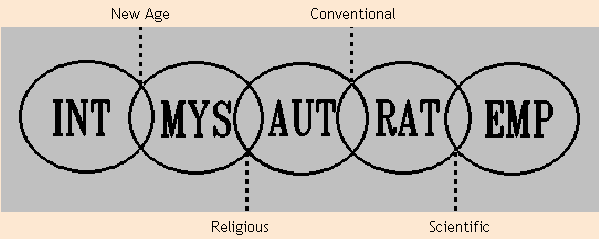
August 1991 WISDOM OF THE WEST
By Travis Hardin
I skip the first chapter--metaphysics, or what is real--because I have already read the second--epistemology--on how we know what is true. When reality is the topic of conversation, I suddenly have to file my nails. For I believe reality is dependent on the means with which we choose to discover it. Talk to me about how you know what you know, and I will say your reality back to you. It will be based on one or more of the five claimed sources of knowledge. Studious Mensan that you are, you contemplate these daily:
(1) Empiricism is the idea that knowledge is derived from sense perception and experience. Knowledge comes by observation. (2) Rationalism is the belief in the innate power of reason, independent of observation. Knowledge comes by internal logic.
(3) Authoritarianism is the belief that the testimony of authorities is an ultimate source of truth.
(4) Mysticism is the belief that truth is to be found in a spirit or spirit world beyond the natural world.
(5) Intuitionism is apprehension of truth that is not the result of conscious reasoning or immediate sense perception. It is direct, emotional in an Ah-Ha! way, and is said to be beyond mere logic.

Now, to speculation: I have arranged the sources of knowledge (FIGURE) according to their substantialness and verisimilitude. Empiricism requires concrete observation; rationalism requires thinking for oneself; the other three require an increasing degree of faith: Faith in a person, faith in a deity, and faith in mystery, respectively.
My grouping has another significance, for the circles overlap. People usually complicate matters by believing in more than one source of knowledge. These compound epistemological beliefs I characterize as world views. Thus the empirical/rational pair describes the scientific world view. Mysticism with authoritarianism describes the religious world view, intuitionism with mysticism describes the New Age and some Eastern religious world views (Taoism among them), while the rational authoritarian (Ugh!) exults in what I will call conventionalism for want of a better word.
Add to epistemology only one more factor, and we simulate
most of the complex
world views. Call it the Psychodynamic Status Factor,
or Anxiety Factor. Let's mix it with
epistemology next time and see what happens.